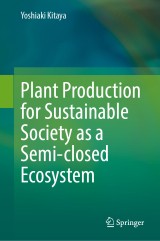Details
Plant Production for Sustainable Society as a Semi-closed Ecosystem
|
149,79 € |
|
| Verlag: | Springer |
| Format: | |
| Veröffentl.: | 29.06.2024 |
| ISBN/EAN: | 9789819702480 |
| Sprache: | englisch |
Dieses eBook enthält ein Wasserzeichen.
Beschreibungen
<div>This book introduces the concept of a semi-closed ecosystem, which is necessary for the social implementation of plant production, such as agriculture, in harmony with the environment. While aiming at achieving a sustainable balance of human activities and environmental protection, this book focuses on the material cycle within each semi-closed system listed below. <p></p></div><p>1) Mangrove forests as semi-closed systems in coastal ecosystems </p><p>2) Environmental control in facility-based plant production systems as semi-closed systems </p><p>3) Control of the gaseous environment in the root zone as a semi-closed system </p><p>4) Controlled ecological life support system as a completely closed ecosystem in space </p><p>5) A sustainable balance of human activities and environmental conservation in urban ecosystems. </p><p>Developing efficient food production with less environmental loads is an important issue. Plant production is vital to human health and welfare, especially in urban areas as semi-closed ecosystems. Producing food efficiently under consideration of environmental protection is necessary with material-cycling systems, especially in semi-closed ecosystems. Establishing a resource recycling production system with reduced waste emissions has also become important in agriculture. Plant production will play an important role not only in food production (Goal 2 in SDGs) but also in many other goals. This book explains how we must regard plant production as semi-closed ecosystems, reduce material and energy resource inputs, and recycle waste emissions generated during production and consumption processes to solve the various issues. Students and researchers studying Agricultural Environmental Engineering, Environmental and Ecological Engineering, Systems Design for Sustainable Society, Environmental Control in Agriculture, etc., will find this publication a helpful reference. </p>
Chapter 1. General introduction.- Chapter 2. Mangrove forests as semi-closed systems in coastal ecosystems.- Chapter 3. Environmental control in facility-based plant production systems as semi-closed systems.- Chapter 4. The gaseous environment in the root zone as a semi-closed system.- Chapter 5. Controlled ecological life support system as a completely closed ecosystem in space.- Chapter 6. Sustainable balance of human activities and environmental conservation in urban ecosystems.- Chapter 7. Concluding remarks.
<div>Yoshiaki Kitaya</div><div><br></div>Professor Emeritus and Project Professor at Organization for Research Promotion of Osaka Metropolitan University, Japan
This book introduces the concept of a semi-closed ecosystem, which is necessary for the social implementation of plant production, such as agriculture, in harmony with the environment. While aiming at achieving a sustainable balance of human activities and environmental protection, this book focuses on the material cycle within each semi-closed system listed below. <p>1) Mangrove forests as semi-closed systems in coastal ecosystems </p><p>2) Environmental control in facility-based plant production systems as semi-closed systems </p><p>3) Control of the gaseous environment in the root zone as a semi-closed system </p><p>4) Controlled ecological life support system as a completely closed ecosystem in space </p><p>5) A sustainable balance of human activities and environmental conservation in urban ecosystems. </p><p>Developing efficient food production with less environmental loads is an important issue. Plant production is vital to human health and welfare, especially in urban areas as semi-closed ecosystems. Producing food efficiently under consideration of environmental protection is necessary with material-cycling systems, especially in semi-closed ecosystems. Establishing a resource recycling production system with reduced waste emissions has also become important in agriculture. Plant production will play an important role not only in food production (Goal 2 in SDGs) but also in many other goals. This book explains how we must regard plant production as semi-closed ecosystems, reduce material and energy resource inputs, and recycle waste emissions generated during production and consumption processes to solve the various issues. Students and researchers studying Agricultural Environmental Engineering, Environmental and Ecological Engineering, Systems Design for Sustainable Society, Environmental Control in Agriculture, etc., will find this publication a helpful reference. </p>
Presents how to think of a system as a semi-closed ecosystem to achieve a material-cycling-oriented society Covers natural ecosystems, agroecosystems, and life-support ecosystems that are closely related to human society Introduces environmental controls in facility-based systems such as facility-type horticulture and plant factories
Diese Produkte könnten Sie auch interessieren:

Agricultural Biodiversity and Biotechnology in Economic Development
von: Joseph Cooper, Leslie Lipper, David Zilberman
Preis: 213,99 €

Policy Reforms and Agriculture Development in Central Asia
von: Sandjar Djalalov, Suresh Chandra Babu
Preis: 213,99 €

Regulating Agricultural Biotechnology
von: Richard E. Just, Julian M. Alston, David Zilberman
Preis: 213,99 €
-
-
© 2024 media control GmbH
Alle Preise enthalten die gesetzliche Mehrwertsteuer. - AGB
- Impressum
- Datenschutzerklärung
- Kontakt
- FAQ
- Mein Konto
- Home
- Erweiterte Suche
- Widerrufsrecht
- Reader-Software
- Desktop-Ansicht
- Gutschein-Code einlösen
